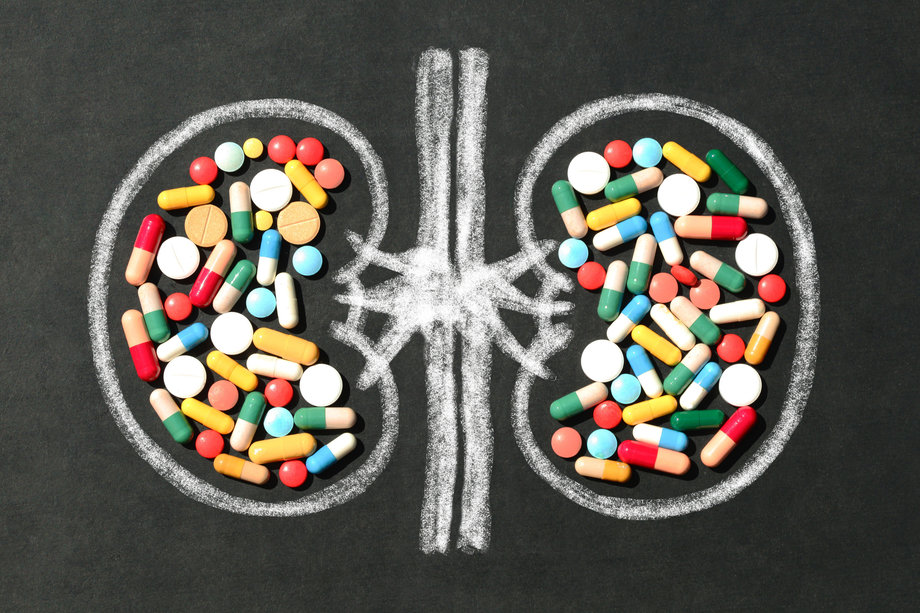What Is The Role Of Antihypertensive Medications In Kidney Health?

This article aims to explore the role of antihypertensive medications in maintaining kidney health.
Hypertension, or high blood pressure, is a common condition that can lead to significant damage to the kidneys. Antihypertensive medications are commonly used to lower blood pressure and prevent further kidney damage.
This introduction provides an overview of the link between hypertension and kidney damage, as well as how antihypertensive medications work to reduce blood pressure. It also discusses the different types of antihypertensive medications and their mechanisms of action.
Additionally, the benefits of antihypertensive medications for kidney health are highlighted. Considerations for choosing the right antihypertensive medication, as well as monitoring and adjusting dosages, are also discussed.
Finally, the potential side effects and risks of antihypertensive medications, as well as the importance of regular blood pressure monitoring and kidney function tests, are addressed.
Key Takeaways
- Long-term use of antihypertensive medications may impact kidney health.
- Close monitoring and regular evaluation of patients on antihypertensive medications is essential.
- Regular blood pressure monitoring is crucial for optimal management of hypertension.
- Kidney function tests help identify adverse effects on renal function.
The Link Between Hypertension and Kidney Damage
The relationship between hypertension and kidney damage has been extensively studied, revealing a concerning link that highlights the urgency of addressing this issue through effective antihypertensive medication.
Hypertension, or high blood pressure, is a major risk factor for kidney disease. The sustained elevation in blood pressure damages the delicate blood vessels in the kidneys, leading to impaired kidney function. This damage can progress to chronic kidney disease and ultimately end-stage renal disease, necessitating dialysis or kidney transplantation.
Antihypertensive medications play a crucial role in maintaining kidney health by reducing blood pressure levels. These medications work by targeting various mechanisms that regulate blood pressure, such as blocking the effects of certain hormones or relaxing the blood vessels. By effectively lowering blood pressure, antihypertensive medications help to mitigate the risk of kidney damage and slow the progression of kidney disease.
Therefore, their impact on kidney health is significant and should not be understated.
How Antihypertensive Medications Reduce Blood Pressure
One way blood pressure is reduced is through the use of drugs that target the mechanisms responsible for regulating the constriction and relaxation of blood vessels. Antihypertensive medications work by blocking certain receptors or enzymes that play a role in the constriction of blood vessels, thereby promoting their relaxation. This leads to a decrease in systemic vascular resistance and subsequently lowers blood pressure.
To paint a picture for the audience, the effectiveness of lifestyle changes in managing hypertension should not be overlooked. Adopting a healthy lifestyle that includes regular exercise, a balanced diet low in sodium and saturated fat, and stress reduction techniques can significantly contribute to blood pressure control. However, lifestyle changes alone may not always be sufficient, and in such cases, antihypertensive medications become crucial to achieve optimal blood pressure levels.
In addition, it is worth mentioning that alternative treatments such as herbal supplements, acupuncture, and relaxation techniques have been explored, but their effectiveness in lowering blood pressure remains inconclusive. Further research is needed to determine their role in hypertension management.
Types of Antihypertensive Medications and Their Mechanisms of Action
Different classes of drugs are used to treat hypertension, each with its own mechanism of action that targets specific pathways involved in blood pressure regulation.
One type of antihypertensive medication is diuretics, which work by increasing the excretion of sodium and water in the kidneys, resulting in reduced blood volume and decreased blood pressure.
Another class of drugs is beta blockers, which block the effects of adrenaline on the heart and blood vessels, leading to reduced heart rate and vasodilation.
Calcium channel blockers, on the other hand, inhibit the movement of calcium ions into smooth muscle cells, resulting in relaxation of the blood vessels and decreased peripheral resistance.
Angiotensin-converting enzyme (ACE) inhibitors and angiotensin receptor blockers (ARBs) work by blocking the effects of angiotensin II, a hormone that constricts blood vessels and promotes the release of aldosterone, a hormone that increases sodium and water retention.
By inhibiting these actions, ACE inhibitors and ARBs result in vasodilation and decreased blood volume, thereby reducing blood pressure.
In conclusion, the different types of antihypertensive medications have distinct mechanisms of action, allowing for targeted treatment of hypertension.
Benefits of Antihypertensive Medications for Kidney Health
Antihypertensive medications have been shown to significantly improve renal function and reduce the risk of kidney damage. The benefits of long-term use of these medications for kidney health are substantial.
Here are three key advantages:
- Slows the progression of kidney disease: Antihypertensive medications help control blood pressure, which is crucial in preventing further damage to the kidneys. By maintaining optimal blood pressure levels, these medications slow down the decline in renal function and delay the progression of kidney disease.
- Reduces the risk of cardiovascular events: Hypertension is a major risk factor for heart disease and stroke. Antihypertensive medications not only protect the kidneys but also lower the risk of cardiovascular complications, including heart attacks and strokes.
- Alternative treatment options: In addition to their primary role in blood pressure management, antihypertensive medications can also be used as alternative treatment options for specific kidney conditions, such as proteinuria. These medications help reduce protein leakage in the urine, thereby preserving kidney function.
Considering the benefits of antihypertensive medications, their long-term use is essential in maintaining kidney health. However, it is crucial to consult with a healthcare professional to determine the most suitable treatment plan and explore alternative options if necessary.
Considerations for Choosing the Right Antihypertensive Medication
When selecting the appropriate treatment for hypertension, several factors need to be considered, including the patient’s medical history, potential side effects, and overall efficacy of the medication. The choice of antihypertensive medication also requires careful consideration of various factors to ensure effectiveness and safety. Dosage adjustments may be necessary for certain medications in patients with impaired kidney function. It is important to monitor kidney function regularly to assess any potential risks and make necessary adjustments to the medication regimen. Adherence to the prescribed antihypertensive medication is crucial for maintaining blood pressure control and preserving kidney health. It is also important for healthcare providers to educate patients about potential side effects and encourage open communication to address any concerns or issues that may arise.
Monitoring and Adjusting Antihypertensive Medication Dosages
Regular monitoring of blood pressure and careful adjustment of medication dosages are essential in maintaining effective treatment for hypertension. This ongoing process ensures that antihypertensive medications are tailored to the individual’s needs, optimizing blood pressure control while minimizing side effects.
Key considerations in monitoring and adjusting medication dosages include:
- Regular blood pressure measurements: Monitoring blood pressure at regular intervals allows healthcare providers to assess the effectiveness of the current medication regimen and make necessary adjustments.
- Individual response: Each person may respond differently to antihypertensive medications, and regular monitoring helps determine if the current dosage is achieving the desired blood pressure reduction.
- Side effects: Monitoring for any adverse effects is crucial, as some individuals may experience medication-related side effects that require dosage adjustments or changes to alternative medications.
- Lifestyle modifications: Regular monitoring allows healthcare providers to assess the impact of lifestyle changes on blood pressure and determine if medication dosages need to be adjusted in response.
By closely monitoring blood pressure and adjusting medication dosages as needed, healthcare providers can optimize treatment and improve kidney health in individuals with hypertension.
Potential Side Effects and Risks of Antihypertensive Medications
Adverse effects and potential risks associated with the use of antihypertensive medications should be carefully considered in order to ensure the safety and effectiveness of hypertension treatment. These medications, while effective in lowering blood pressure, can also have potential side effects.
Common side effects include dizziness, fatigue, and gastrointestinal disturbances. However, more serious adverse effects such as electrolyte imbalances, kidney dysfunction, and allergic reactions can also occur.
Additionally, antihypertensive medications may interact with other drugs, leading to potential drug interactions that can affect their efficacy or increase the risk of adverse effects.
Long-term use of antihypertensive medications may also have implications for kidney health, as certain medications can cause or exacerbate kidney dysfunction. Therefore, close monitoring and regular evaluation of patients on antihypertensive medications is essential to minimize the potential risks and ensure optimal kidney health.
Importance of Regular Blood Pressure Monitoring and Kidney Function Tests
It is crucial to regularly monitor blood pressure and conduct kidney function tests to ensure optimal management of hypertension and minimize potential complications. Regular blood pressure monitoring allows healthcare professionals to assess the effectiveness of antihypertensive medications and make necessary adjustments to achieve target blood pressure levels. Additionally, kidney function tests, such as measuring serum creatinine and estimating glomerular filtration rate (eGFR), help identify any adverse effects of antihypertensive medications on renal function.
In addition to monitoring blood pressure and kidney function, lifestyle modifications play a vital role in managing hypertension. These modifications include maintaining a healthy diet, engaging in regular physical activity, limiting alcohol consumption, and avoiding tobacco use. By adopting these lifestyle changes, individuals can reduce their blood pressure levels and potentially decrease the need for antihypertensive medications.
Furthermore, it is important to consider potential interactions between antihypertensive medications and other medications. Some medications, such as nonsteroidal anti-inflammatory drugs (NSAIDs), can interfere with the effectiveness of antihypertensive drugs or worsen kidney function. Therefore, healthcare providers should be aware of these potential interactions and adjust treatment plans accordingly.
| Lifestyle Modifications | Potential Interactions |
|---|---|
| Healthy diet | NSAIDs |
| Regular physical activity | Certain diuretics |
| Limited alcohol consumption | ACE inhibitors |
| Avoidance of tobacco use | ARBs |
Frequently Asked Questions
Can antihypertensive medications cure kidney damage caused by hypertension?
Antihypertensive medications are effective in managing hypertension and reducing the risk of kidney damage. However, they cannot cure existing kidney damage caused by hypertension. These medications may have side effects that should be considered and monitored by healthcare professionals.
Are antihypertensive medications safe to use during pregnancy for women with kidney disease?
The safety of using antihypertensive medications during pregnancy for women with kidney disease is a concern due to their potential effects on fertility and fetal development. Further research is needed to determine their safety and optimal use in this population.
How long does it take for antihypertensive medications to start lowering blood pressure?
The duration of antihypertensive medication effects varies depending on factors such as the specific medication used, the individual’s response to treatment, and any concurrent health conditions. These factors can influence the efficacy of antihypertensive medications in lowering blood pressure.
Can antihypertensive medications prevent the progression of kidney disease in individuals with hypertension?
Antihypertensive medications play a crucial role in preventing kidney damage in individuals with hypertension. By effectively managing blood pressure, these medications help reduce the risk of kidney disease progression and protect overall kidney health.
Are there any alternative treatments to antihypertensive medications for managing kidney health in individuals with hypertension?
Alternative therapies and lifestyle modifications can be considered for managing kidney health in individuals with hypertension. These approaches may include dietary changes, physical activity, stress reduction techniques, and complementary therapies like acupuncture or herbal supplements.









